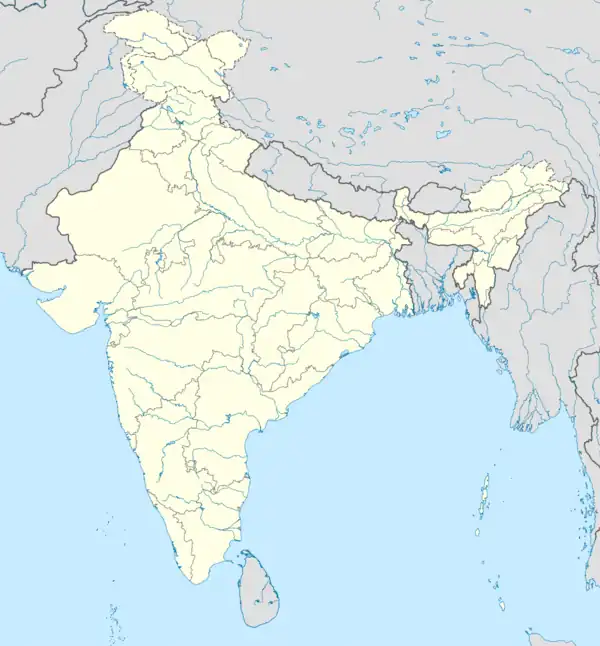Sahebganj, Paschim Bardhaman
Sahebganj is a census town in the Raniganj CD block in the Asansol Sadar subdivision of the Paschim Bardhaman district in the Indian state of West Bengal.
Sahebganj | |
|---|---|
Census Town | |
 Sahebganj Location in West Bengal, India  Sahebganj Sahebganj (India) | |
| Coordinates: 23.589293°N 87.105954°E | |
| Country | |
| State | West Bengal |
| District | Paschim Bardhaman |
| Population (2011) | |
| • Total | 4,715 |
| Languages* | |
| • Official | Bengali, Hindi, English |
| Time zone | UTC+5:30 (IST) |
| PIN | 713121 |
| Telephone/ STD code | 0341 |
| Vehicle registration | WB |
| Lok Sabha constituency | Asansol |
| Vidhan Sabha constituency | Asansol Dakshin |
| Website | bardhaman |
Geography
MC: Municipal Corporation, CT: census town, N: neighbourhood, R: rural centre
Owing to space constraints in the small map, the actual locations in a larger map may vary slightly
Location
Sahebganj is located at 23.589293°N 87.105954°E.[1]
Jemari (J.K. Nagar Township), Belebathan, Murgathaul, Amkula, Egara, Sahebganj, Raghunathchak and Ballavpur form a cluster of census towns on the western and southern side of Raniganj. Banshra and Baktarnagar are adjacent to Raniganj on the eastern side.[1]
Urbanisation
According to the 2011 census, 83.33% of the population of the Asansol Sadar subdivision was urban and 16.67% was rural.[2] In 2015, the municipal areas of Kulti, Raniganj and Jamuria were included within the jurisdiction of Asansol Municipal Corporation.[3] Asansol Sadar subdivision has 26 (+1 partly) Census Towns.(partly presented in the map alongside; all places marked on the map are linked in the full-screen map).
Demographics
According to the 2011 Census of India, Sahebganj had a total population of 4,715 of which 2,430 (52%) were males and 2,285 (48%) were females. Population in the age range 0–6 years was 473. The total number of literate persons in Sahebganj was 3,424 (80.72% of the population over 6 years).[4]
*For language details see Raniganj (community development block)#Language and religion
According to the 2011 census, the urban agglomeration (UA) centred upon Asansol had a population of 1,243,414. In addition to the erstwhile municipalities of Kulti, Jamuria, and Raniganj subsequently incorporated into the Asansol Municipal Corporation, the agglomeration included the census towns of Amkula, Baktarnagar, Ballavpur, Bhanowara, Domohani, Egara, Jemari (J.K. Nagar Township), Majiara, Murgathaul, Raghunathchak, Sahebganj and Topsi, and also Charanpur, an outgrowth of Jamuria.[5][3]
Infrastructure
According to the District Census Handbook 2011, Bardhaman, Sahebganj covered an area of 1.66 km2. Among the civic amenities, it had 6.5 km roads with open drains, the protected water-supply involved tapwater from treated source, uncovered wells. It had 590 domestic electric connections. Among the medical facilities it had were one dispensary/ health centre, one family welfare centre, and two medicine shops. Among the educational facilities it had were 4 primary schools, other school facilities at Ballavpur nearby. It had one non-formal education centre (Sarba Siksha Abhiyan). Among the commodities it produced were paddy, seeds, and vegetables.[6]
Economy
As per the ECL website telephone numbers, operational collieries in the Satgram Area in 2018 are: Chapui Khas Colliery, JK Nagar Project, Jemehari Colliery, Kalidaspur Project, Kuardi Colliery, Nimcha Colliery, Pure Searsole Colliery, Ratibati Colliery, Satgram Project and Satgram Incline.[7]
As per the ECL website telephone numbers, operational collieries in the Kunustoria Area in 2018 are: Amritnagar Colliery, Amrasota Colliery, Bansra Colliery, Belbaid Colliery, Kunustoria Colliery, Mahabir OCP, North Searsole Colliery, Parasea Colliery, Parasea 6 & 7 Incline and Parasea OCP.[8]
References
- "Census of India 2011, West Bengal: District Census Handbook, Barddhaman" (PDF). Map of Raniganj CD Block, page 215. Directorate of Census Operations, West Bengal. Retrieved 31 August 2018.
- "District Statistical Handbook 2014 Burdwan". Table 2.2, 2.4(a). Department of Statistics and Programme Implementation, Government of West Bengal. Retrieved 4 September 2018.
- "The Kolkata Gazette" (PDF). Notification No. 335/MA/O/C-4/1M-36/2014 dated 3 June 2015. Department of Municipal Affairs, Government of West Bengal. Retrieved 4 September 2018.
- "2011 Census – Primary Census Abstract Data Tables". West Bengal – District-wise. Registrar General and Census Commissioner, India. Retrieved 31 August 2018.
- "Constituents of Urban Agglomerations having population 1 lakh and above" (PDF). Provisional Population Total, Census of India 2011. Government of India. Retrieved 27 August 2018.
- "District Census Handbook Barddhaman, Census of India 2011, Series 20, Part XII A" (PDF). Section II Town Directory, Pages 1179-1210; Statement I: Status and Growth History, Page 1179; Statement II: Physical Aspects and Location of Towns, Page 1188; Statement III: Civic and other Amenities, Page 1191; Statement IV: Medical Facilities, Page 1196; Statement V: Educational, Recreational and Cultural Facilities, Page 1200; Statement VI:Industry and Banking, Page 1209. Directorate of census Operations V, West Bengal. Retrieved 14 May 2020.
- "Area wise Closed User Group (CUG) Telephone Numbers" (PDF). Sripur Area. Eastern Coalfields Limited. Retrieved 31 August 2018.
- "Area wise Closed User Group (CUG) Telephone Numbers" (PDF). Kunustoria Area. Eastern Coalfields Limited. Retrieved 18 August 2018.
